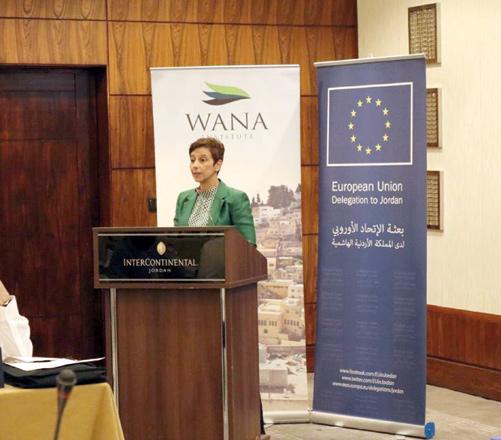You are here
EU reaffirms commitment to strengthen relations with Jordan
By JT - Jul 07,2021 - Last updated at Jul 07,2021

EU ambassador to Jordan Maria Hadjitheodosiou speaks during a country event organised by the West Asia-North Africa (WANA) Institute on Monday (Photo courtesy of WANA Institute)
AMMAN — The European Union on Monday reaffirmed its commitment to strengthening its strategic relationship with Jordan during a country event organised by the West Asia-North Africa (WANA) Institute.
The country event aimed to explore more in-depth bilateral dynamics of the New Agenda for the Mediterranean and to promote an inclusive debate around the EU Joint Communication on the Renewed Partnership with the Southern Neighbourhood and its implementation in Jordan. This comes as part of the project “EuroMeSCo: Connecting the Dots” co-funded by the EU and the European Institute of the Mediterranean (IEMed), according to a statement from the WANA Institute.
The event offered a platform for discussion on relevant issues of the communication, and involved representatives from think tanks, academic institutions, government, civil society organisations, and business community representatives as well as EU officials.
During the meeting, Maria Hadjitheodosiou, EU ambassador to Jordan, stressed that the renewed partnership with the Southern Neighbourhood responds to today’s challenges faced by the countries of the region, including Jordan and proposes real solutions to common regional problems, such as climate change and migration, paving the way for an inclusive green growth that would also cater for the COVID-19 recovery. Thus, the main pillars of the Joint Communication are: Human development and good governance; resilience, prosperity and digital transition; peace and security; migration and mobility; and green transition, in line with the EU Green Deal.
Hadjitheodosiou said: “Along the lines of this Joint Communication, the EU intends to maintain the strong and broad partnership that it has entertained with Jordan so far: Contributing to creating growth and jobs, investing in an inclusive human development and capital and sustaining good governance with the broad objective of contributing to the prosperity and stability of the region.
“Among these three main priorities, we want today to shed more light on two specific areas, considering their importance for the development of Jordan at this point in time and the expertise that the EU can provide: Green growth and Social protection.”
The 25th anniversary of the Barcelona Declaration, which launched the Euro-Mediterranean partnership, creates momentum for in-depth reflections on what has succeeded and what new tangible results are still required, the statement said.
Shereen Shaheen, the director of the programme at the WANA Institute, clarified that the EuroMeSCo, which is a Euro-Mediterranean network of 104 think tanks and research institutes from 29 different Euro-Mediterranean countries, is implementing the Connecting the Dots project to contribute to inclusive and evidence-based policymaking.
It aims to foster research and recommendations in relation with European Neighbourhood Policy (ENP) South priorities, and in particular on economic development, migration and security.
Shaheen added that the EU-Jordan partnership is essential to combat the impact of COVID-19, which requires more stability, security and prosperity to create jobs that meet the needs of tomorrow and to promote sustainable development.
Presentations from two experts at the WANA Institute framed the debate around the water sector in Jordan and the joint EU-Jordan trade, after which a debate unfolded among the attendees.
Majd Al Naber, team leader and senior researcher, said that the urgency of water resource management in Jordan has never been more needed than nowadays, challenges facing the sector are exacerbated and accelerated with the climate change effects and with the sudden increase in the population due to refugee’s influx. To sustain this limited resource, innovative solutions need to be adopted to increase water use efficiency, decrease the non-revenue water, and enhance both water and sanitation network systems, Naber said.
Senior researcher Kareem Sharabi stated that according to a EUROMED survey, it has become clear that trade represents the chief economic interest between Jordan and the EU.
However, due to water scarcity and reliance on energy imports constraining Jordan’s manufacturing, authorities increasingly need to invest in specialised sectors in line with both global trends and Jordanian skills. Jordanians could especially benefit from developing their Information and Communications Technology (ICT) sector, Sharabi said.
Related Articles
AMMAN () — The West Asia-North Africa (WANA) Institute on Wednesday hosted an event on the current challenges of EU-Jordan trade relations a
Acknowledging the severe impact of the Syrian crisis on the Kingdom, the EU has provided more than 225 million euros of humanitarian and development aid to Jordan over the last two years in support of refugees and host communities.
AMMAN — The 14th EU-Jordan Association Council meeting will convene in the Kingdom for the first time next month, EU Ambassador to Jordan Ma











